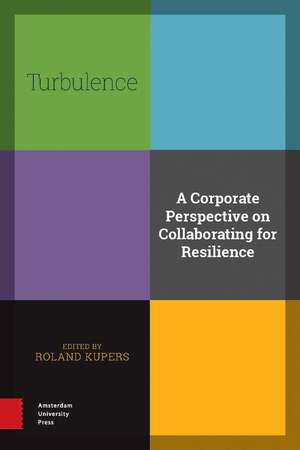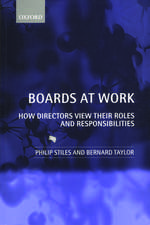Turbulence – A Corporate Perspective on Collaborating for Resilience
Autor Roland Kupersen Limba Engleză Hardback – 12 mai 2014
The ever tighter linking of our food, water, and energy systems in the context of a changing climate is leading to increasing turbulence in the world. As a consequence, it becomes ever more crucial to develop cities, regions, and economies with resilience in mind. Because of multinational corporations’ global reach, substantial resources, and information-driven leadership structures, these entities can play a major, constructive role in improving our understanding and design of resilient systems.
This volume is the product of the Resilience Action Initiative, a collaboration among Dow, DuPont, IBM, McKinsey, Shell, Siemens, Swiss Re, Unilever, and Yara designed to explore possible corporate contributions to global resilience, especially at the nexus of water, food, and energy. Aggressively forward-thinking and consistent with an enlightened self-interest, the ideas considered here represent a corporate perspective on the broad collaborations required for a more resilient world.
This volume is the product of the Resilience Action Initiative, a collaboration among Dow, DuPont, IBM, McKinsey, Shell, Siemens, Swiss Re, Unilever, and Yara designed to explore possible corporate contributions to global resilience, especially at the nexus of water, food, and energy. Aggressively forward-thinking and consistent with an enlightened self-interest, the ideas considered here represent a corporate perspective on the broad collaborations required for a more resilient world.
Preț: 397.39 lei
Preț vechi: 431.95 lei
-8% Nou
Puncte Express: 596
Preț estimativ în valută:
76.05€ • 79.10$ • 62.78£
76.05€ • 79.10$ • 62.78£
Carte disponibilă
Livrare economică 24 martie-07 aprilie
Livrare express 08-14 martie pentru 31.64 lei
Preluare comenzi: 021 569.72.76
Specificații
ISBN-13: 9789089647122
ISBN-10: 9089647120
Pagini: 188
Dimensiuni: 169 x 239 x 18 mm
Greutate: 0.48 kg
Ediția:New.
Editura: Amsterdam University Press
ISBN-10: 9089647120
Pagini: 188
Dimensiuni: 169 x 239 x 18 mm
Greutate: 0.48 kg
Ediția:New.
Editura: Amsterdam University Press
Notă biografică
Roland Kupers is an independent consultant on complexity, resilience, and energy transition, as well as an associate fellow at the Smith School of Enterprise and the Environment at the University of Oxford.
Cuprins
Editor’s foreword
Roland Kupers
Preface
Peter Voser
Turbulence—by way of an introduction
Michel Liès
Part I Introduction to RAI
1. The Resilience action initiative: An introduction
Maike Böggermann and Norbert Both
Understanding the ‘stress nexus’
The Resilience Action Initiative
Definition of resilience
The RAI approach
Knowledge projects
The challenges of resilience in practice
Broader sharing and dialogue
Collaboration and leadership
Part II The resilience lens
2. A pragmatic frame to explore resilience
Marco Albani and Roland Kupers
A diagnostic frame
Beyond a diagnostic frame
The boundary conundrum
The difficult relationship between efficiency and resilience
Dealing with multiple scales
Making system assumptions explicit
Open questions and dilemmas
3. A resilience lens for enterprise risk management
David N. Bresch, Jaap Berghuijs, Rainer Egloff and Roland Kupers
Enriching corporate risk management
Structural resilience
Integrative resilience
Transformative resilience
4. Multi-sector collaboration for resilience
Mark Smith
Change for resilience
Collaboration for systemic change
Applying collaboration to resilience
Conclusion: A collaborative agenda for resilience
5. Building resilience through teamwork: Seven tips to make it work
Marco Albani and Kimberly Henderson
Part III Resilience in action
6. The case for green infrastructure
Neil C. Hawkins and Glenn Prickett
Introduction and objective
Green infrastructure: Concept and definition
Green infrastructure: Solution examples
Identifying areas of opportunity
Key conclusions
Moving forward
7. Nexus! Resilience in a pressure cooker
Herman van der Meyden
The game development process
The game mechanics
Simulating aspects of resilience
Insights from a year of Nexus! sessions
8. Getting to resilience from the bottom-up
Thekla Teunis
Fading boundaries and stronger horizontal and local networks
Initial results
Main lessons
Barriers for breakthrough bottom-up innovation
Business value
9. Corporations and Resilience
Simone Arizzi, Maximilian Egger, Dawn Rittenhouse and Peter Williams
The Resilience Action Initiative
Conclusion
Epilogue
Brian Walker
Appendix
Author biographies
Bibliography
Index
Roland Kupers
Preface
Peter Voser
Turbulence—by way of an introduction
Michel Liès
Part I Introduction to RAI
1. The Resilience action initiative: An introduction
Maike Böggermann and Norbert Both
Understanding the ‘stress nexus’
The Resilience Action Initiative
Definition of resilience
The RAI approach
Knowledge projects
The challenges of resilience in practice
Broader sharing and dialogue
Collaboration and leadership
Part II The resilience lens
2. A pragmatic frame to explore resilience
Marco Albani and Roland Kupers
A diagnostic frame
Beyond a diagnostic frame
The boundary conundrum
The difficult relationship between efficiency and resilience
Dealing with multiple scales
Making system assumptions explicit
Open questions and dilemmas
3. A resilience lens for enterprise risk management
David N. Bresch, Jaap Berghuijs, Rainer Egloff and Roland Kupers
Enriching corporate risk management
Structural resilience
Integrative resilience
Transformative resilience
4. Multi-sector collaboration for resilience
Mark Smith
Change for resilience
Collaboration for systemic change
Applying collaboration to resilience
Conclusion: A collaborative agenda for resilience
5. Building resilience through teamwork: Seven tips to make it work
Marco Albani and Kimberly Henderson
Part III Resilience in action
6. The case for green infrastructure
Neil C. Hawkins and Glenn Prickett
Introduction and objective
Green infrastructure: Concept and definition
Green infrastructure: Solution examples
Identifying areas of opportunity
Key conclusions
Moving forward
7. Nexus! Resilience in a pressure cooker
Herman van der Meyden
The game development process
The game mechanics
Simulating aspects of resilience
Insights from a year of Nexus! sessions
8. Getting to resilience from the bottom-up
Thekla Teunis
Fading boundaries and stronger horizontal and local networks
Initial results
Main lessons
Barriers for breakthrough bottom-up innovation
Business value
9. Corporations and Resilience
Simone Arizzi, Maximilian Egger, Dawn Rittenhouse and Peter Williams
The Resilience Action Initiative
Conclusion
Epilogue
Brian Walker
Appendix
Author biographies
Bibliography
Index
Recenzii
“An excellent presentation of the Resilience Action Initiative. . . . Required reading for those interested in global resilience. Recommended.”










